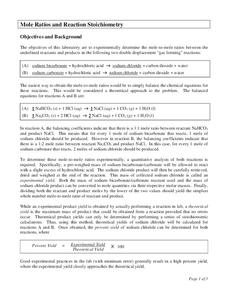Santa Monica College
Single and Double Displacement Reactions
If you aren't part of the solution, you are part of the precipitate! Young chemists learn about single and double displacement reactions including precipitation reactions, neutralization reactions, and gas forming reactions. They perform...
Intel
Lights, Camera, Reaction!
Excite classes with a STEM project-based learning lesson covering chemical reactions. Groups study the different types through simulations and hands-on activities. They pick one type (synthesis, decomposition, single displacement, double...
Curated OER
Micro-Reaction Lab: Gas Prouducing Reactions
Learners investigate single displacement or double displacement reactions. They have to identify the type of gas produced by filling in the blanks to a data and observation sheet. Also, having to be done is writing balanced equations for...
Curated OER
Types of Chemical Reactions
Students conduct labs to gain an overview of chemical reactions. They observe examples of synthesis, decomposition, single displacement and double displacement reactions. They identify certain products by the use of litmus and splint tests.
Santa Monica College
Mole Ratios and Reaction Stoichiometry
Stoichiometry sounds complicated, but it really means the study of the amount of substances involved in a reaction. The sixth lesson plan in an 11-part series has scholars use stoichiometry to find the theoretical yield of a reaction....
Curated OER
A Solution for Precipitation
Students predict the product of chemical reaction using the solubility rules. In this chemistry lesson, students balance ionic equation. They perform a lab to check if their predicted products are correct.
Science Education Resource Center at Carleton College
Serc: Vector Addition: Determining the Displacement in Your School
In this physics indoor lab students calculate the displacement from one corner of the school to the other.
Science Education Resource Center at Carleton College
Serc: Molar Relationships: Observing a Single Displacement Reaction
For this chemistry lab, students will investigate a single replacement reaction while also using knowledge of molar ratios to determine percent yields.









